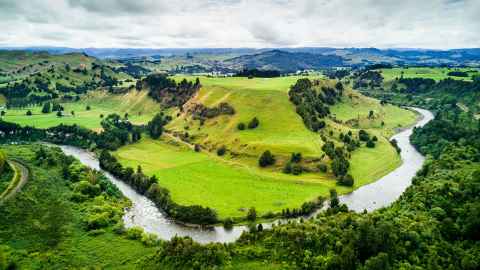Covid-19 could trigger systemic change
24 April 2020
Opinion: Will we advance the low-consuming, low-energy, low-mobility lifestyle the pandemic has forced upon us? Klaus Bosselmann says this could be the virus’s legacy.

These are interesting times, quite beyond lockdowns and bubble. Covid-19 reminds us nature is in charge of human destiny, not governments. Countries the world over are trying to meet unprecedented challenges which are all occurring at once.
Faced with such complexity, some political leaders have reacted like headless chicken, others in a more rational manner, but all with a sense of urgency, yet unsure what to do next.
For the moment, they rely on experts on health risks, but they may increasingly need experts of systemic risks. A systemic risk stems from the possibility that a singular event could trigger instability or collapse of an entire system, in this instance, a global economy which is focused on the consumption of goods, including tourism, rather than the wellbeing of people and the planet, which are interdependent.
If a jumping virus like Covid-19 can bring the entire economy to instability and potential collapse, then this tells us a lot about fragilities of such a system and also about the way we humans govern ourselves.
To begin with, epidemiological statistics inform us Covid-19 is just one of countless zoonotic diseases which originate in animals. They account for billions of illnesses and millions of deaths annually. Global wildlife trade has been a main driver. In China alone, the trade with wild animals has an estimated value of US$18 billion per year. And in 2007 leading epidemiologists described the presence of coronaviruses in bats, combined with the culture of eating exotic animals in Southern China, as ‘a time bomb’.
Clearly, a worldwide ban of wildlife markets is now overdue.
Connected with the disastrous commodification of wildlife is the ever-growing, economically driven appetite for land, wetlands, forests and natural resources, which is blurring the line between wildlife and human spaces, accelerating loss of biodiversity, destroying the natural world and deteriorating the climate.
Each of these environmental issues deserve our full attention, but they are inter-related and can only be tackled systematically.
It would be too simple to blame politics or capitalism or overpopulation. The systemic problem goes deeper. We need to rethink human-nature relationships. Humans are part and parcel of the natural world. Boundaries between species are not absolute, but mere markers for the continuum of life. The virus reminds us of that.
So, when will modern society, supposedly educated in evolution and ecology, find a way out of the human-centred (anthropocentric) worldview that has dominated Western thinking for centuries? Nature is not ‘the other’ and life is not something disconnected from humans. Over the past 30 years, scholarship in environmental science, philosophy and law has adopted non-anthropocentric strategies that recognise the intrinsic value of nature and the life-supporting essentials of Earth’s ecological systems. Is this of purely academic interest? Not at all.
In more than 20 global agreements, states have expressed a fundamental duty to co-operate in order to protect and restore the integrity of Earth’s ecological systems (atmosphere, biosphere, oceans, water and land). Talk is cheap, of course, especially at levels of global diplomacy and rhetoric. So far, hard economics have consistently trumped soft duties of caring for the Earth.
If taken seriously, however, this duty would revolutionise everything we know about economics. It would mean the integrity of ecological systems would set the parameters for social and economic development, not the other way round.
The defining moment with Covid-19 will occur when we come out the other end. That moment will either bring us back to where we had been before (business as usual), or will lead us to continue and advance the low-consuming, low-energy, low-mobility lifestyle that was forced upon us, but may have been experienced as not all bad.
Maybe there is merit in exploring more sustainable forms of consumption and production. This could be what political philosophers refer to as a ‘constitutional moment’ when society starts to think about the fundamentals of how it wishes to be governed and what kind of policies and laws it expects from its government.
Thanks to the ‘Greta effect’, climate action has finally become a stronger prospect, not the least here in New Zealand. We may also realise a ‘Covid-19 effect’, especially here in New Zealand. It has to do with taking nature seriously like that demonstrated, for example, in the Te Awa Tupua Act 2017. This Act gave legal personality to the Whanganui River and, in doing so, recognised the intrinsic value of nature.
Embedded in the Act is the philosophy of kaitiakitanga as an expression of deep kinship between humans and the natural world. A seed only, but Prime Minister Jacinda Ardern has promoted kaitiakitanga to world leaders at the United Nations in New York and at the Global Economic Forum in Davos. Perhaps now is the time to think further about it and see how it can work here at home.
Environmental trusteeship would halt rampant destruction of nature and enable social and economic development set on firm, truly sustainable ground. Let’s make this the lasting legacy of the virus.
Klaus Bosselmann is Professor of Law in the Faculty of Law, director of the New Zealand Centre for Environmental Law at the university and chair of the Earth Trusteeship Initiative.
This article reflects the opinion of the author and not necessarily the views of the University of Auckland.
Used with permission from Newsroom Covid-19 could trigger systemic change 24 April 2020.
Media queries
Alison Sims | Research Communications Editor
DDI 09 923 4953
Mob 021 249 0089
Email alison.sims@auckland.ac.nz